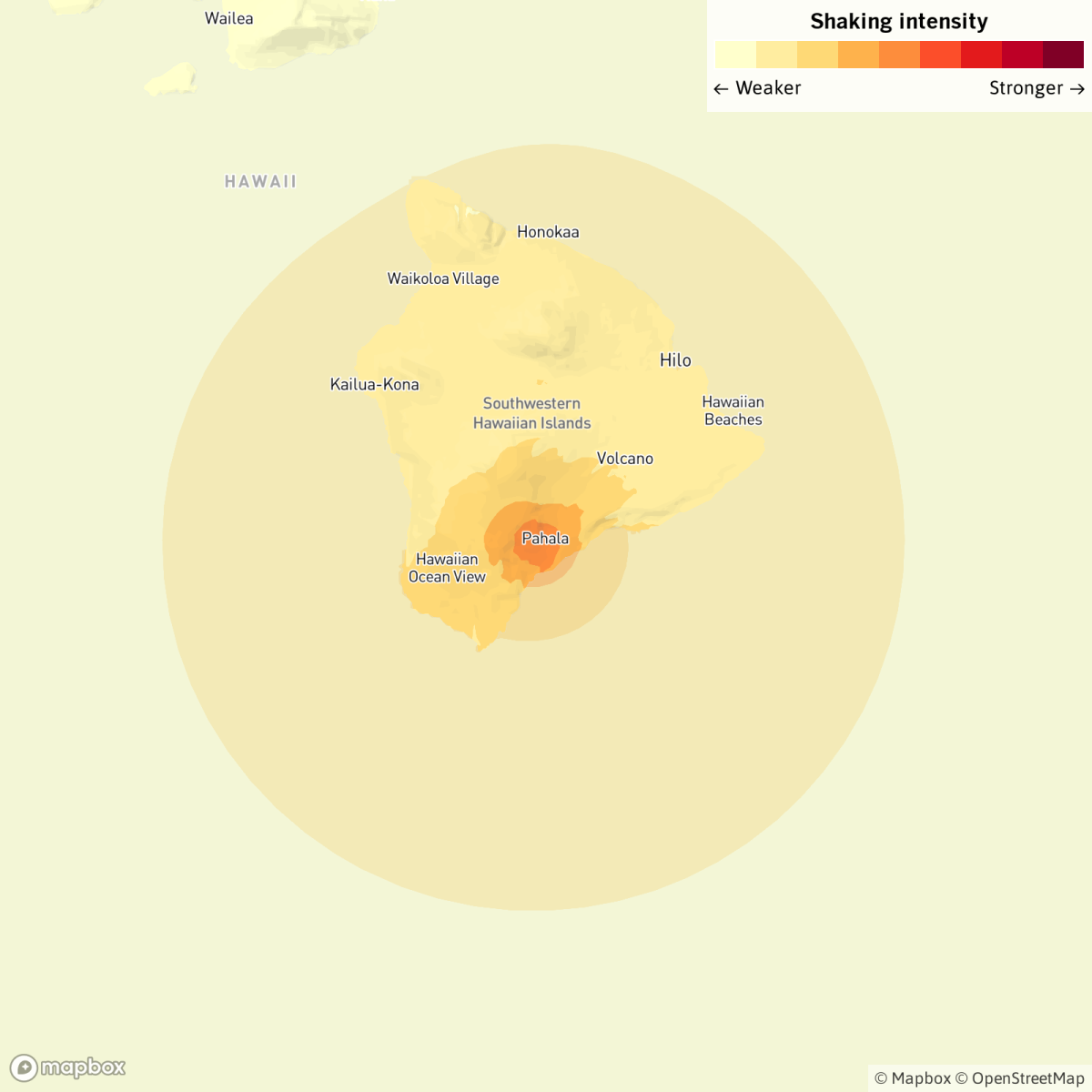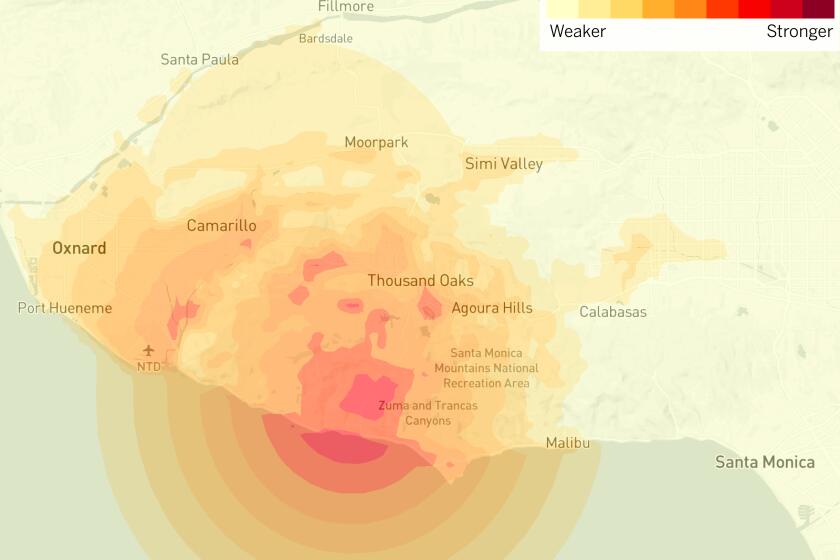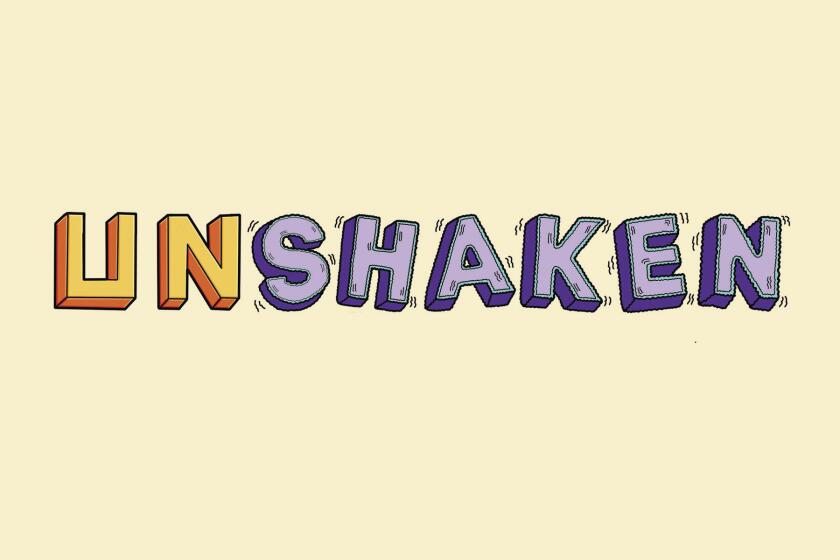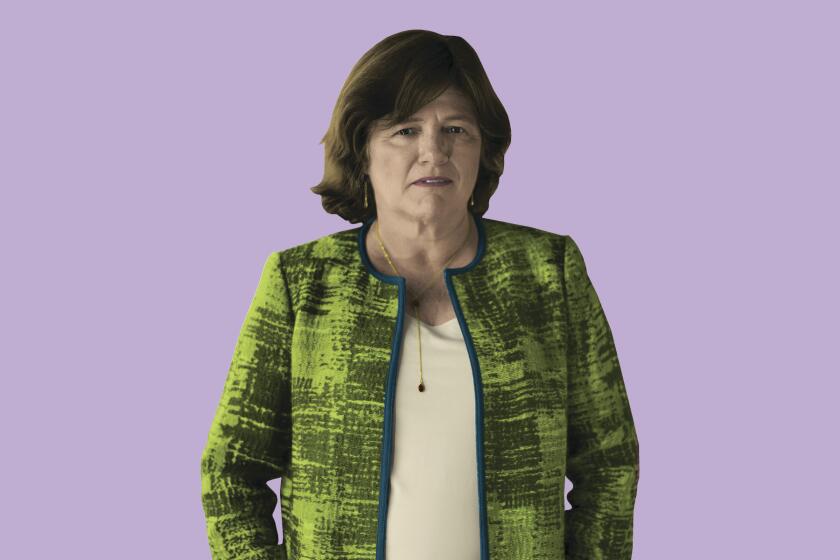Magnitude 5.7 earthquake hits Hawaii’s Big Island; felt as far away as Honolulu

- Share via
A magnitude 5.7 earthquake shook a remote part of Hawaii’s Big Island on Friday.
It was felt as far as Honolulu, more than 200 miles away, reports said — likely because of the depth of the earthquake, calculated at 23 miles under sea level.
An earlier estimate calculated the earthquake as magnitude 6.3.
At least 10 aftershocks of magnitude 2.5 and higher had been recorded within an hour and a half of the initial temblor, about one every 10 minutes. No tsunami occurred.
The Hawaii earthquake was not related to a magnitude 4.6 quake that struck near Malibu about an hour and a half later and was felt across a wide swath of Southern California.
The earthquake on the Big Island, which occurred on the southeastern flank of Mauna Loa — the largest active volcano on the planet — had no apparent impact on it or the neighboring Kilauea volcano, the U.S. Geological Survey’s Hawaiian Volcano Observatory said.
The quake, which occurred at 10:06 a.m. Hawaii time, produced “very strong” shaking in the town of Pahala, with a population of 1,900 on the southern side of the island, as defined by the Modified Mercalli Intensity Scale. Very strong shaking can cause considerable damage in poorly built structures.
A magnitude 4.6 earthquake struck near Malibu on Friday and was felt across a wide swath of Southern California.
The earthquake, and several aftershocks, were evident across Hawai’i Volcanoes National Park, said Jessica Ferracane, a spokesperson for the park. The Kilauea visitor center at the park is about 23 miles from the epicenter and received light shaking, defined as just enough to rattle dishes and windows. It can feel like a vehicle striking a building.
“It was definitely a good violent shake,” she said. The “visitor contact station shook really, really hard, but so far no reports of damage.”
No issues were immediately apparent at the massive park, which covers more than 300,000 acres.
The guide to earthquake readiness and resilience that you’ll actually use.
Earthquakes are common in Hawaii, and this section of the Big Island in particular “has seen a lot of seismic activity since maybe 2015, but especially since 2019, with a whole series of magnitude 5’s in this year,” said Mike Poland, a geophysicist with the U.S. Geological Survey.
The earthquakes might be caused by instability in the deep magma plumbing systems for the Big Island. “It’s not directly related to the volcanoes,” Poland said.
“We wouldn’t see, you know, this magnitude 5.7, and then a week later or even a month later, ‘Definitely there’s going to be an eruption,’ ” Poland said. “The volcanoes are behaving sort of independently from the activity that we’re seeing down in this area that’s been very active seismically for the last many years.”
Tabitha Kamakawiwoole was working at a coffee shop in Pahala when she heard the earthquake coming before she felt it.
“You could hear it rolling in, but we couldn’t really tell how big,” the 19-year-old said. “I didn’t know the direction to run to,” so she just waited it out, feeling the building shake.
“It’s been awhile since we had a big one like that,” she said.
She checked the security cameras at her home, noticing that a few windows opened and things fell off the shelf — but the biggest impact was her fishbowl: “My poor fish experienced a little tsunami.”
The fish is OK, though, Kamakawiwoole said, and she hadn’t heard of much other damage.
“It wasn’t that big,” she said. “I’ve lived on this island for a very long time, so really earthquakes [don’t] faze me.”
People are much more important than kits. People will help each other when the power is out or they are thirsty. And people will help a community rebuild and keep Southern California a place we all want to live after a major quake.
Light shaking was felt in Hilo, the island’s largest town, and Kailua-Kona, home to many of the island’s resorts on its western coast. Both communities are about 45 miles from the epicenter.
George Baranov was at his gym in Kailua-Kona when he felt what he thought was someone dropping a bunch of heavy weights.
“I felt the floor shake pretty hard,” the 26-year-old said. He said he didn’t realize it was an earthquake until talking to someone later.
Most people felt the quake, he said, but he hadn’t seen any damage so far, adding: “It happens a lot here.”
The epicenter was about 135 miles southeast of Kahului, the largest town on Maui, and about 215 miles from Honolulu.
Other recent large earthquakes on or near the Big Island include a magnitude 6.2 just off the southern coast in 2021, and a magnitude 6.9 in 2018, which was shallower and more strongly felt. The 2018 earthquake occurred as the Kilauea volcano was erupting.
The island’s most powerful earthquake since Hawaii became a state was a magnitude 7.7 in 1975, with an epicenter about 27 miles southeast of Hilo.
“And that was really devastating. It caused a tsunami on the south part of the island of Hawaii that killed a few campers ... on the beach [and] caused an awful lot of damage,” Poland said.
An even larger earthquake, likely a magnitude 8, occurred in 1868 on the Big Island’s southern coast. “And that caused landslides and some mud flows that destroyed at least one Hawaiian community,” Poland said.
The 1868 and 1975 earthquakes were shallower, “and they were driven by the motion of a very large fault that basically sits at the boundary between the pre-existing ocean floor and the island itself,” Poland said. Every and now then, that surface “jumps and slides.”
In 2006, a magnitude 6.7 earthquake occurred off the northwestern coast of the Big Island, about 17 miles northeast of Kailua-Kona. “And that actually damaged some of the resort areas in the North Kohala district, north of Kona,” Poland said. Historic structures were also damaged, including Kalahikiola Congregational Church, which saw its unreinforced stone walls collapse.
“Hawaii is definitely earthquake country,” Poland said.
More to Read
Sign up for Essential California
The most important California stories and recommendations in your inbox every morning.
You may occasionally receive promotional content from the Los Angeles Times.















